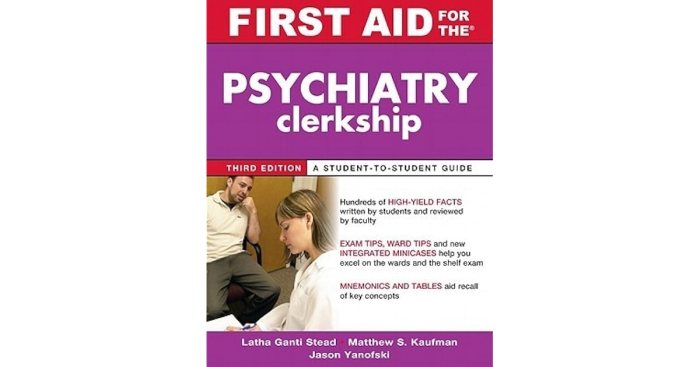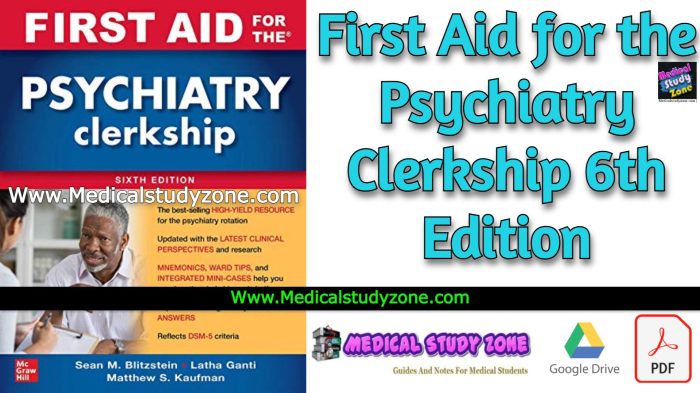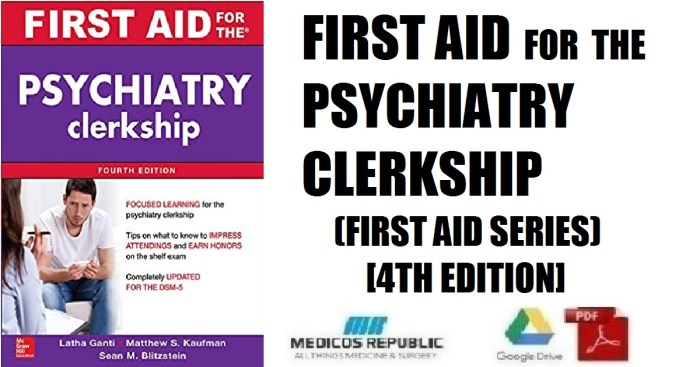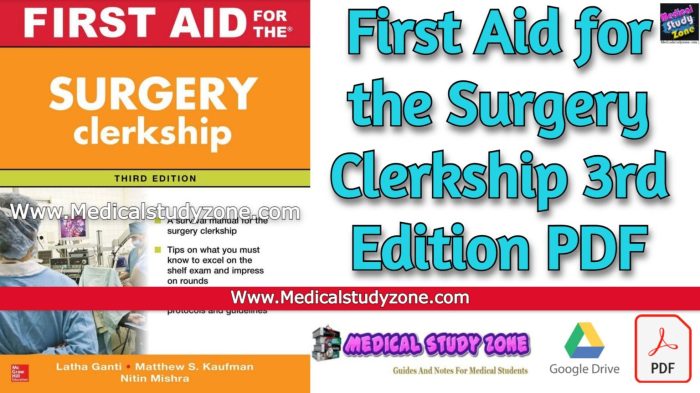First aid for the psychiatry clerkship is a critical component of psychiatric training, providing clerks with the essential knowledge and skills to effectively manage mental health emergencies and provide appropriate interventions. This comprehensive guide delves into the principles, assessment, interventions, communication, and support systems involved in providing first aid in the psychiatry clerkship.
Understanding the basics of mental health first aid, including its principles and importance in the psychiatry clerkship, is paramount. Clerks will encounter various mental health emergencies, and this guide equips them with the knowledge to recognize and respond appropriately to these situations.
Mental Health First Aid Basics: First Aid For The Psychiatry Clerkship

Mental health first aid is the initial assistance provided to individuals experiencing mental health crises or distress. It aims to stabilize the person, prevent further harm, and facilitate access to professional help. The principles of mental health first aid include approaching the person with empathy and non-judgment, actively listening, providing reassurance, and encouraging professional help.
Mental health first aid is crucial in the psychiatry clerkship as clerks often encounter patients with mental health emergencies. Common mental health emergencies include suicide attempts, self-harm, acute psychosis, and substance abuse.
Assessment and Intervention

Assessing a patient’s mental health status involves gathering information about their current symptoms, history of mental illness, and risk factors. Active listening, open-ended questions, and observation are key assessment techniques.
Therapeutic interventions in mental health first aid include active listening, empathy, crisis management, and encouraging professional help. Active listening involves paying attention to both verbal and non-verbal cues, and reflecting back on what the person is saying. Empathy is the ability to understand and share the feelings of another person.
Crisis management involves assessing the immediate risk to the person or others and taking steps to mitigate that risk. Encouraging professional help involves connecting the person with appropriate mental health services.
The effectiveness of interventions can be evaluated based on the person’s response, such as reduced distress, increased safety, and willingness to seek professional help.
Communication and Collaboration

Effective communication is crucial in mental health first aid. It involves using clear and concise language, being respectful and non-judgmental, and actively listening to the person. Collaborating with other healthcare providers, such as nurses, social workers, and psychiatrists, ensures comprehensive care for the patient.
Confidentiality and respecting patient rights are ethical principles that must be upheld in all interactions. Maintaining confidentiality involves protecting the patient’s personal information and only sharing it with authorized individuals. Respecting patient rights includes respecting their autonomy, informed consent, and right to privacy.
Resources and Support
Various resources are available for mental health support, including hotlines, websites, and community organizations. Crisis hotlines provide immediate support and guidance in mental health emergencies. Websites and community organizations offer information, support groups, and resources for mental health conditions.
Self-care and support systems are essential for psychiatry clerks to maintain their own mental well-being. Self-care involves taking care of one’s physical, emotional, and mental health. Support systems include family, friends, colleagues, and mental health professionals who provide support and encouragement.
Resources for accessing mental health support for both patients and healthcare professionals include the National Suicide Prevention Lifeline, the National Alliance on Mental Illness (NAMI), and the American Psychological Association (APA).
Case Studies and Simulations

Case studies and simulations provide opportunities to apply mental health first aid principles in a realistic setting. Case studies present hypothetical scenarios that clerks can analyze and discuss. Simulations involve role-playing exercises where clerks practice their assessment and intervention skills.
By analyzing cases and participating in simulations, clerks can enhance their understanding of mental health first aid, develop their communication and intervention skills, and increase their confidence in providing support to individuals experiencing mental health distress.
Quick FAQs
What are the key principles of mental health first aid?
The key principles of mental health first aid include assessing the situation, providing reassurance, listening actively, offering support, and encouraging professional help when necessary.
What are some common mental health emergencies that clerks may encounter?
Common mental health emergencies include suicidal thoughts or behaviors, acute psychosis, severe anxiety or panic attacks, and substance intoxication or withdrawal.
How can clerks effectively communicate with patients experiencing mental health emergencies?
Clerks can effectively communicate with patients experiencing mental health emergencies by using active listening, empathy, and clear and concise language. They should also maintain a non-judgmental and supportive attitude.